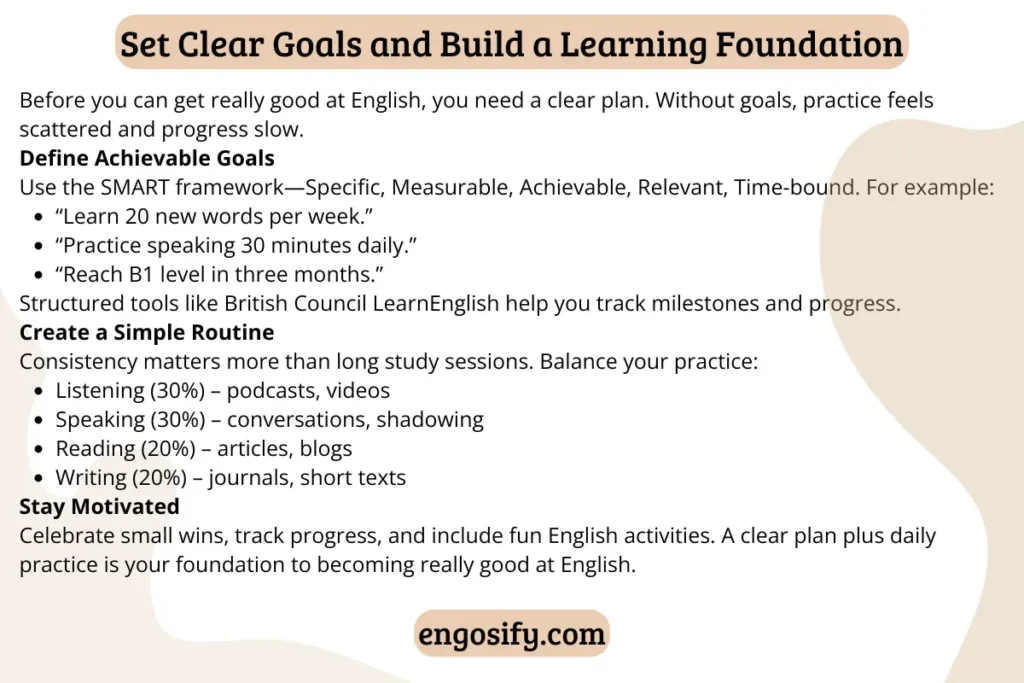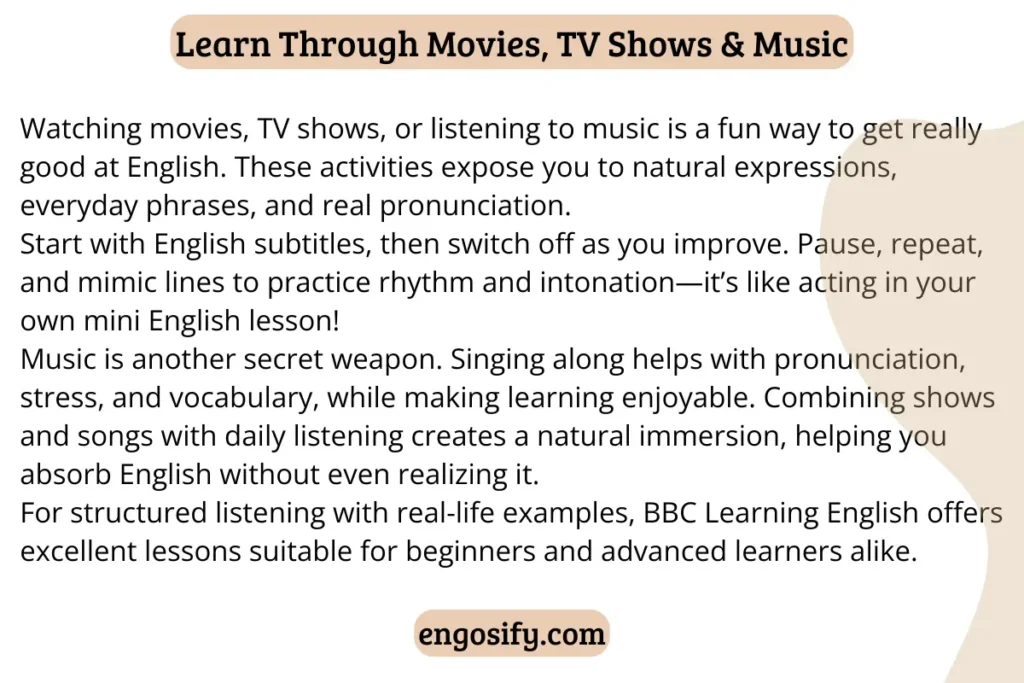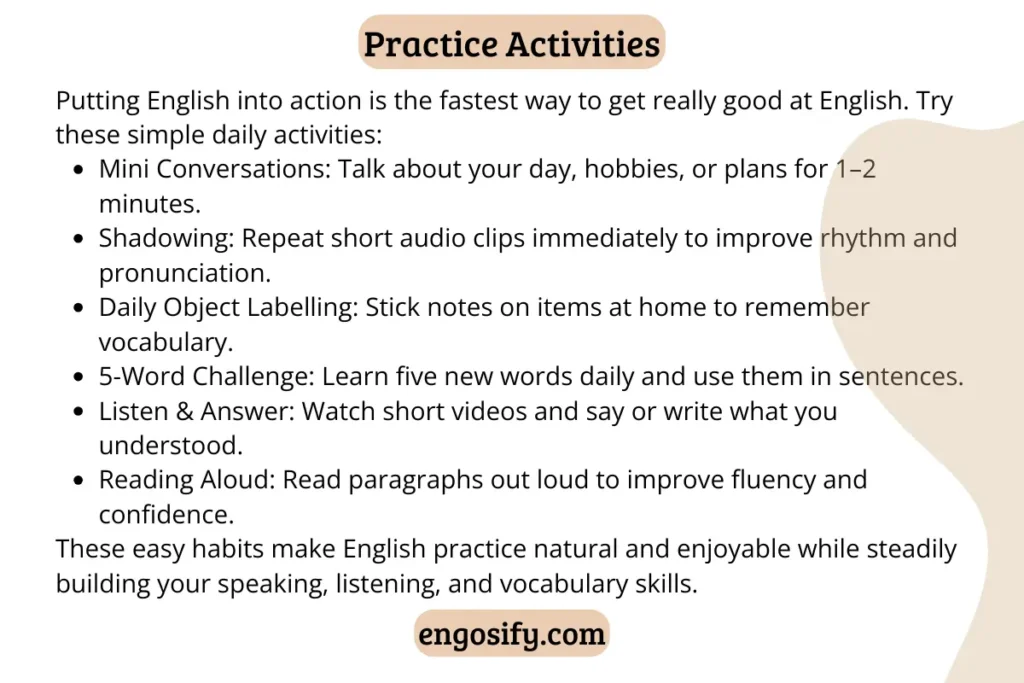Introduction to Getting Good at English
Becoming really good at English is a mix of mindset, consistency, and smart learning techniques. Instead of focusing only on textbooks, it’s about using English in real situations. Whether you want better job opportunities, smoother travel experiences, or simply more confidence, mastering English opens countless doors. Yet many learners feel overwhelmed because they try to do everything at once. That’s why it’s crucial to understand what “being really good” actually means.
What Does “Getting Really Good at English” Mean?
Being skilled in English doesn’t mean having a perfect accent or knowing every grammar rule under the sun. Instead, it’s about fluency—the ability to express yourself naturally—along with solid listening, reading, and writing skills. When you’re truly comfortable with the language, you can follow conversations, read articles with ease, and write without overthinking every sentence. More importantly, you begin to think in English, which is a major step toward real fluency.
Why It Matters
English is the global language of work, study, entertainment, and international communication. Once you improve your English skills, you gain access to more information, better career options, and richer cultural experiences. Learning it also boosts your confidence and helps you connect with people from all around the world. If you’re eager to practice through structured lessons, BBC Learning English offers excellent free resources.
What You Will Learn in This Guide
Throughout this article, you’ll uncover practical, actionable methods based on proven learning strategies. From immersion and vocabulary building to speaking practice and evaluation, every section gives you tools you can use right away. By applying them consistently, you’ll steadily transform your English from “okay” to really good—and you might even enjoy the journey more than you expected.
Set Clear Goals and Build a Learning Foundation
Getting really good at English doesn’t happen by accident. It starts with having a clear direction and a solid routine. Without a plan, you’ll feel like you’re chasing the language instead of mastering it. So before diving into speaking, listening, or writing, you need a strong foundation that guides your learning every single day.
Define Specific, Achievable Goals
One of the biggest mistakes English learners make is saying, “I want to improve my English,” without defining how. Vague goals lead to vague progress. Instead, use the SMART approach—Specific, Measurable, Attainable, Relevant, and Time-bound.
For example:
- “Learn 20 new vocabulary words every week.”
- “Practice speaking for 30 minutes a day.”
- “Move from A2 to B1 in 3 months.”
These goals are concrete, easy to track, and realistically achievable. When you can measure your progress, your motivation skyrockets. And, as many experts highlight, having a structure keeps your learning focused. The British Council LearnEnglish platform is packed with level-based exercises that help you monitor your growth step-by-step.
Create a Consistent Study Routine
Consistency beats intensity—every time. It’s better to learn for 20 minutes daily than cram for 3 hours once a week. A good routine balances the four essential skills: listening, speaking, reading, and writing. Try dividing your practice like this:
- 30% listening (podcasts, videos, conversations)
- 30% speaking (voice notes, shadowing, conversations)
- 20% reading (articles, books, blogs)
- 20% writing (journals, summaries, messages)
A simple planner, phone reminders, or habit-tracking apps will help you stick to your plan effortlessly.

Build a Motivation Mindset
Learning English is a marathon, not a sprint. That’s why developing a positive mindset is just as important as studying. Celebrate the small wins—finishing a book chapter, understanding a conversation, or using a new phrase correctly. When you track your progress and see how far you’ve come, it’s easier to stay motivated during tough days.
If you ever feel stuck, switch up your routine, try fun activities, or explore new topics. Progress feels faster when learning doesn’t feel like a chore.
Immersion: Surround Yourself With English
If you truly want to get really good at English, immersion is your secret weapon. When English becomes part of your daily life, you start absorbing it naturally—almost without trying. The more you hear, read, and interact with the language, the quicker your brain adapts. Immersion doesn’t require moving to an English-speaking country; you can create an English-filled world right where you are.
Listen Actively Every Day
Listening is the fastest way to boost your fluency because it exposes you to real pronunciation, rhythm, stress, and natural expressions. But don’t just hear English—listen actively. That means paying attention, repeating phrases, and trying to understand both meaning and tone.
Try:
- Podcasts
- English YouTube channels
- Audiobooks
- News clips
- Tutorials
A highly effective technique is shadowing, where you repeat what you hear at the same time. It trains your mouth and brain to work together smoothly, helping you sound more natural. And if you want structured audio lessons, BBC Learning English offers excellent listening materials for all levels.
Learn Through Movies, TV Shows & Music
Movies and TV shows are treasure chests of everyday English. They expose you to idioms, slang, humor, and natural conversation styles. Start with English subtitles, then gradually switch to no subtitles as you improve. Pause, repeat, and mimic short lines—yes, mimic like you’re an actor.
Music works wonders too. Singing along sharpens your pronunciation, rhythm, and vocabulary. Plus, it makes learning more fun, which boosts long-term consistency.
Read Diversely & Regularly
Reading strengthens vocabulary, grammar, and comprehension without feeling overwhelming. And because English content is everywhere, you can read anything that interests you—news, blogs, stories, recipes, even social media posts.
A smart strategy is to mix easy content with slightly challenging texts. This way, you build confidence while gently pushing your limits. If something feels too hard, skim for the main idea first, then reread slowly for details. Over time, you’ll expand your vocabulary naturally and start recognizing patterns in sentence structure.
Practice Speaking Confidently
If there’s one skill that makes people feel really good at English, it’s speaking. Yet it’s also the area most learners avoid because they’re scared of sounding silly. But here’s the truth: you can’t become fluent without speaking—a lot. The good news? You don’t need perfect grammar or a flawless accent to communicate confidently. You just need practice, patience, and the courage to open your mouth even when it feels uncomfortable.
Speak as Much as Possible
Speaking often is the fastest path to fluency because it forces your brain to produce English, not just recognize it. Look for opportunities everywhere:
- Language exchange apps
- Conversation clubs
- Voice chats with friends
- Practicing phrases during daily routines
You can even create imaginary dialogues—ordering food, asking for directions, or greeting someone. This role-play style practice strengthens real-life communication.
If you prefer structured conversation practice with clear explanations, Oxford Online English fluency lessons can guide you step-by-step toward more natural speaking.
Record and Self-Evaluate Your Speech
Recording yourself may feel awkward at first, but it’s incredibly effective. When you listen back, you’ll quickly catch pronunciation issues, unclear phrases, or places where you hesitated. Over time, these recordings become proof of your improvement.
Try this simple routine:
- Record a 1–2 minute talk about your day.
- Listen back and note mistakes or unnatural phrasing.
- Record again using better rhythm, intonation, and vocabulary.
To improve even faster, combine this with shadowing—repeating native speakers word for word. It sharpens your accent and boosts your speaking confidence.
Think in English, Not Translate
One major leap toward fluency happens when you stop translating and start thinking in English. Translation slows you down and makes your sentences sound unnatural. Instead, train your brain using short English “chunks” like:
- “I’m not sure about that…”
- “Let me think…”
- “That sounds interesting!”
These ready-made expressions make conversations smoother and more natural. With time, your thoughts begin forming directly in English, cutting out the mental middleman and speeding up your speaking tremendously.

Improve Vocabulary & Grammar the Smart Way
Building strong vocabulary and grammar skills is essential if you want to get really good at English. But here’s the trick: you don’t need to memorize huge lists or read grammar books all day. Instead, focus on smart, practical learning strategies that help you remember and actually use what you learn.
Learn Vocabulary in Context, Not Isolation
Memorizing random words rarely works because your brain forgets what it doesn’t use. Learning vocabulary in context—inside real sentences, stories, videos, or conversations—helps you understand meaning, tone, and usage instantly.
For example, instead of memorizing the single word “improve,” learn it as a phrase like:
- “I want to improve my English skills.”
- “This method helps you improve faster.”
These “chunks” stick in your memory and make your speech more natural.
To reinforce vocabulary, try:
- Creating example sentences
- Using flashcards (physical or digital)
- Writing short daily journals
- Reviewing words after 24 hours, 7 days, and 30 days (spaced repetition)
Use Grammar as a Tool, Not a Fear
Being good at English doesn’t mean knowing every grammar rule. It means understanding the patterns you use every day. Grammar should help you communicate—not stress you out.
Start with the grammar that appears most often:
- Present simple & present continuous
- Past simple
- Future forms
- Modal verbs (can, should, must)
- Conditionals
Look for grammar in real content—TV shows, conversations, articles—and observe how native speakers use it naturally. Over time, these patterns become automatic.
Expand Vocabulary With Smart Techniques
Here are simple but powerful ways to grow your vocabulary naturally:
- Read widely: blogs, stories, news, lifestyle articles
- Use synonym clusters: learn groups like quick, fast, rapid
- Learn topic-based vocabulary: travel, business, cooking, daily routines
- Practice with active recall: try recalling definitions without looking
When you meet a new word, always ask yourself:
“Can I use this in my life?”
If the answer is yes, write it down and practice it immediately.
Build Grammar Intuition Through Exposure
The more English you consume—listening, reading, speaking—the better your grammar becomes without conscious effort. This “intuition” helps you create correct sentences automatically.
To strengthen this intuition, try reviewing example sentences from trusted sources like BBC Learning English or English learner blogs. Seeing real-world grammar improves your internal sense of what “sounds right.”
Practice Activities
Putting your beginner English knowledge into action is the fastest way to build confidence. Try these simple, daily activities to strengthen listening, speaking, reading, and vocabulary:
1. Mini Conversations
Practice short dialogues about everyday topics—greetings, food, shopping, or family. Keep each conversation under one minute and repeat it several times.
2. Shadowing
Choose a short audio clip and repeat after the speaker. Focus on rhythm and pronunciation rather than perfection.
3. Daily Object Labelling
Place sticky notes on items around your home (door, fridge, cup, table). Seeing words daily helps with memory and word recognition.
4. 5-Word Challenge
Learn just five new words a day. Use each word in a sentence to make the meaning stick.
5. Listen & Answer
Watch a short video and write or say three things you understood. This trains comprehension and active recall.
6. Reading Aloud
Read a simple paragraph out loud each day. This improves pronunciation, fluency, and confidence.

Common Beginner Mistakes & Fixes
Even motivated beginners make predictable mistakes—here’s how to fix them quickly and confidently:
1. Translating Word-by-Word
Mistake: Learners translate every sentence from their native language.
Fix: Focus on simple English sentence patterns like Subject + Verb + Object. Practice thinking in short English phrases.
2. Mispronouncing Common Sounds
Mistake: English sounds like th, v, or r can be difficult.
Fix: Practice with minimal pairs: think–sink, very–berry, rice–lice. Repeat slowly, then faster.
3. Using the Wrong Verb Tense
Mistake: Beginners often overuse the present tense.
Fix: Master basic forms first:
- I am (present)
- I was (past)
- I will (future)
4. Forgetting Articles (a, an, the)
Mistake: Articles are often missing or used incorrectly.
Fix: Remember:
- a/an = general things
- the = specific things already known
5. Long, Complicated Sentences
Mistake: Trying to sound advanced too early.
Fix: Keep sentences short:
“I like this book.” → “It is easy.” → “I want another.”
6. Avoiding Speaking Out of Fear
Mistake: Waiting “until I’m better” to speak.
Fix: Start now with easy topics: your day, your plans, your family. Progress comes from mistakes.
7. Confusing Similar Words
Mistake: Mixing up words like some and any, much and many.
Fix: Learn words in context, not alone. Example:
- “Do you have any milk?”
- “I have some water.”
FAQs
1. How can I learn English faster as a beginner?
You’ll learn faster when you mix daily practice with simple English activities—listening, speaking, reading, and writing. Short sessions every day work better than long study marathons.
2. What is the best way to practice speaking?
Start with easy conversations about your day, your plans, or your hobbies. You can also use free speaking tools like Conversation Exchange or join friendly language forums.
3. Do I need to study grammar first?
Not really. It’s better to learn grammar while using the language. Simple patterns, real conversations, and short dialogues help you remember grammar naturally.
4. How long does it take to speak basic English?
Most learners can speak simple English in a few months if they practice regularly. The more you use the language, the quicker you’ll grow.
5. What resources are best for beginners?
Beginners do well with apps, easy English stories, flashcards, and listening tools. Websites like ESL Fast and BBC Learning English are great for simple practice.
6. Why do I forget vocabulary so quickly?
Because you’re not reusing it enough. Try writing small sentences with new words, or use them in daily chats. Repetition makes the words stick.
7. How can I improve my English pronunciation?
Shadowing helps a lot—listen to a short sentence and repeat it immediately. Focus on rhythm and stress instead of individual words.
8. Should I practice with native speakers?
It helps, but it’s not required. Even speaking with other learners boosts confidence and builds real communication skills.
9. What mistakes do beginners usually make?
Beginners often translate too much, avoid speaking, or use long and confusing sentences. Keep it simple, practice daily, and let mistakes teach you.
10. How do I stay motivated while learning English?
Set tiny goals, like “learn 5 new words” or “watch a 3-minute video.” Celebrate small wins—they keep you moving forward.
Conclusion
Getting really good at English doesn’t happen overnight, yet it becomes much easier when you build steady habits, stay curious, and practice a little every day. When you mix speaking, listening, reading, and vocabulary work, your progress grows naturally—and without stress. Although mistakes might slow you down, they also guide you toward clearer, stronger communication. Keep your learning simple, stay consistent, and use English in real-life situations as often as you can. With patience and the right activities, you’ll soon notice that English feels more natural, more comfortable, and even more enjoyable. Keep going—your confidence will grow faster than you think.

